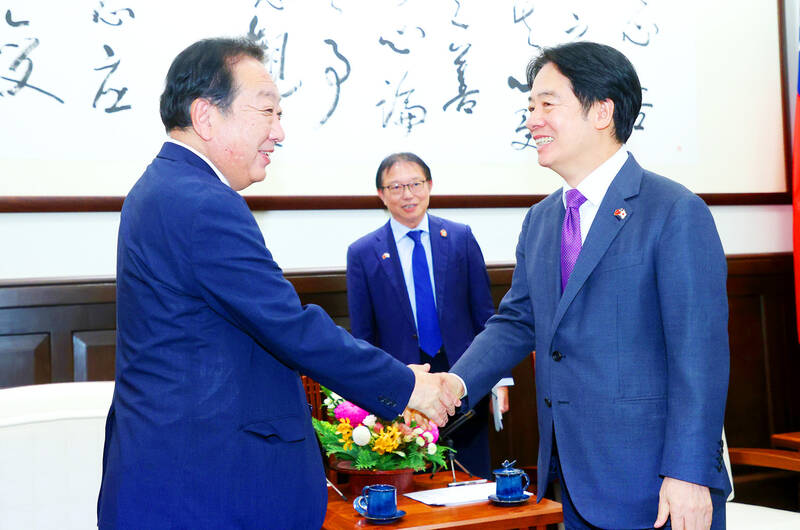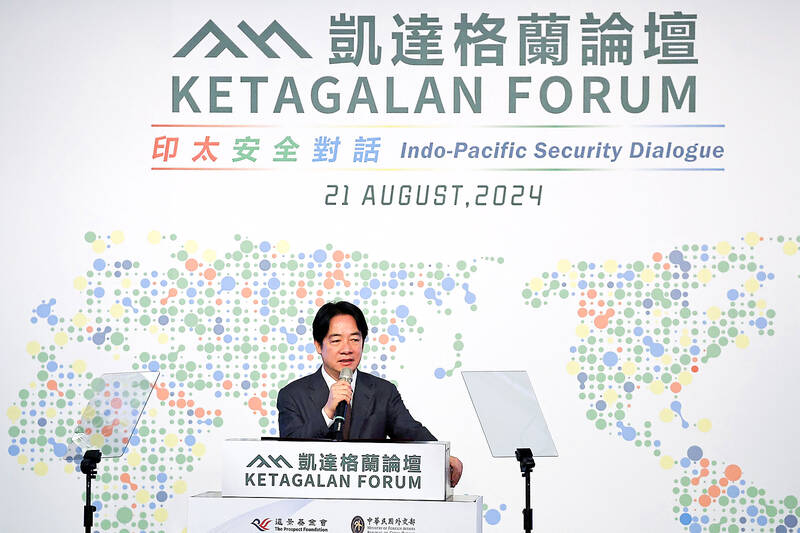China’s authoritarian expansionism would not stop with Taiwan, President William Lai (賴清德) said yesterday, calling for solidarity among the world’s democracies to check Beijing’s territorial ambitions.
Taiwan is determined to become a decisive force for democracy, peace and prosperity, standing side-by-side with its democratic partners to confront authoritarian expansionism and protect shared values, he told the annual Ketagalan Forum on Indo-Pacific security in Taipei.
Authoritarianism is now a global challenge, Lai said, using as examples Chinese military expansionism, economic coercion and the use of hybrid warfare tactics such as cyberattacks and cognitive warfare.

Photo: CNA
“We are all fully aware that China’s growing authoritarianism will not stop with Taiwan, nor is Taiwan the only target of China’s economic pressures,” he said. “China intends to change the rules-based international order. That is why democratic countries must come together and take concrete action.”
Taiwan “will not be intimidated” in confronting the security threat posed by China and upholding its responsibility to regional peace and stability as part of the first island chain, Lai said.
Detailing his four-pillar plan for peace — a policy he discussed while campaigning to be president — Lai said the administration’s first order of business is to bolster Taiwan’s defensive capabilities.

Photo: Reuters
Military spending is being increased to ensure Taiwan is more self-reliant regarding national defense, Lai said, adding that the policy is based on domestic production, foreign arms procurement and the creation of a technology transfer mechanism for emerging technologies.
Taiwan must also increase economic security by diversifying investments to spread trade risks and reduce its dependency on China, Lai said.
China accounted for 11.4 percent of Taiwan’s foreign investments last year and 31.2 percent of the nation’s trade volume in the first quarter, compared with 83.8 percent and 43 percent in 2010 respectively, he said.
The government is pursuing trade agreements with nations such as Australia, Canada, Japan, Lithuania, South Korea and the US to increase economic resilience, Lai said.
Taiwan has entered second-phase negotiations with Washington on the US-Taiwan 21st Century Trade Initiative and recently signed a deal with Ottawa, he said.
His administration plans to deepen its partnerships with other democracies and the forum is a part of that effort, he said.
Those attending this year’s forum are to deliberate Taiwan’s role in the push to stabilize global supply chains, he said, adding that the government is working with other nations to create “democracy chips.”
Taiwan would enhance cooperation with other democracies to deter aggression from China, prevent the rise of conflicts in the region and “achieve our goal of peace through strength,” Lai said.
As a responsible member of the international community intent on maintaining the “status quo” in the Taiwan Strait, the nation would not shy away from conducting talks with Beijing under the conditions of equality and dignity, he said.
Former Japanese prime minister Yoshihiko Noda told the forum that Taiwan and Japan have signed more than 60 cooperative agreements, including a bilateral investment agreement and a commitment to realizing the Treaty on Open Skies.
Japan would back Taiwan’s bid to join the Comprehensive and Progressive Agreement for Trans-Pacific Partnership as the two sides share the universal values of freedom, democracy, human rights and rule of law, he said.
Taiwan’s exclusion from the WHO undermines the global effort to protect health, and he supports the meaningful participation of Taiwan in the World Health Assembly, the WHO’s decisionmaking body, Noda said.
Citing comments by heads of state calling for peace and stability in the Taiwan Strait, he said that the international community has reached a consensus on Taiwan’s importance to the rules-based global order.
Japan, with its close ties to Taiwan, should lead the effort to inform the world about its significance, Noda said, adding that he is in “staunch opposition to any unilateral attempt to change the status quo by force or coercion.”
Disputes between Taiwan and China must be resolved peacefully, he said.

‘CHARM OFFENSIVE’: Beijing has been sending senior Chinese officials to Okinawa as part of efforts to influence public opinion against the US, the ‘Telegraph’ reported Beijing is believed to be sowing divisions in Japan’s Okinawa Prefecture to better facilitate an invasion of Taiwan, British newspaper the Telegraph reported on Saturday. Less than 750km from Taiwan, Okinawa hosts nearly 30,000 US troops who would likely “play a pivotal role should Beijing order the invasion of Taiwan,” it wrote. To prevent US intervention in an invasion, China is carrying out a “silent invasion” of Okinawa by stoking the flames of discontent among locals toward the US presence in the prefecture, it said. Beijing is also allegedly funding separatists in the region, including Chosuke Yara, the head of the Ryukyu Independence

UNITED: The premier said Trump’s tariff comments provided a great opportunity for the private and public sectors to come together to maintain the nation’s chip advantage The government is considering ways to assist the nation’s semiconductor industry or hosting collaborative projects with the private sector after US President Donald Trump threatened to impose a 100 percent tariff on chips exported to the US, Premier Cho Jung-tai (卓榮泰) said yesterday. Trump on Monday told Republican members of the US Congress about plans to impose sweeping tariffs on semiconductors, steel, aluminum, copper and pharmaceuticals “in the very near future.” “It’s time for the United States to return to the system that made us richer and more powerful than ever before,” Trump said at the Republican Issues Conference in Miami, Florida. “They

GOLDEN OPPORTUNITY: Taiwan must capitalize on the shock waves DeepSeek has sent through US markets to show it is a tech partner of Washington, a researcher said China’s reported breakthrough in artificial intelligence (AI) would prompt the US to seek a stronger alliance with Taiwan and Japan to secure its technological superiority, a Taiwanese researcher said yesterday. The launch of low-cost AI model DeepSeek (深度求索) on Monday sent US tech stocks tumbling, with chipmaker Nvidia Corp losing 16 percent of its value and the NASDAQ falling 612.46 points, or 3.07 percent, to close at 19,341.84 points. On the same day, the Philadelphia Stock Exchange Semiconductor Sector index dropped 488.7 points, or 9.15 percent, to close at 4,853.24 points. The launch of the Chinese chatbot proves that a competitor can

‘VERY SHALLOW’: The center of Saturday’s quake in Tainan’s Dongshan District hit at a depth of 7.7km, while yesterday’s in Nansai was at a depth of 8.1km, the CWA said Two magnitude 5.7 earthquakes that struck on Saturday night and yesterday morning were aftershocks triggered by a magnitude 6.4 quake on Tuesday last week, a seismologist said, adding that the epicenters of the aftershocks are moving westward. Saturday and yesterday’s earthquakes occurred as people were preparing for the Lunar New Year holiday this week. As of 10am yesterday, the Central Weather Administration (CWA) recorded 110 aftershocks from last week’s main earthquake, including six magnitude 5 to 6 quakes and 32 magnitude 4 to 5 tremors. Seventy-one of the earthquakes were smaller than magnitude 4. Thirty-one of the aftershocks were felt nationwide, while 79